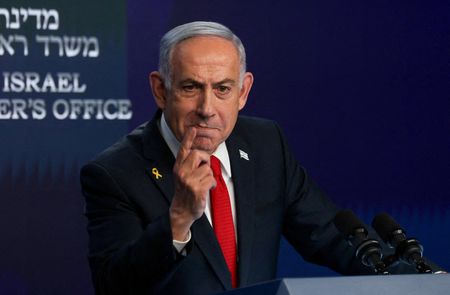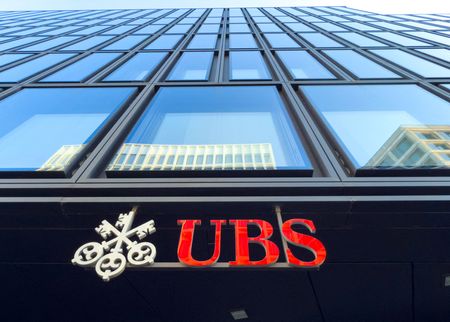By James Mackenzie and May Angel
JERUSALEM (Reuters) -For Israeli Prime Minister Benjamin Netanyahu, the shooting of two young embassy staffers at a Jewish event in Washington was a horrific example of the antisemitism that has flared across the world since the Hamas-led attack on Israel on October 7, 2023.
Washington police arrested a lone suspect, who allegedly chanted pro-Palestinian slogans before shooting Yaron Lischinsky, a researcher at the Israeli embassy, and Sarah Milgrim, an administrative assistant.
Netanyahu branded the killings as “a despicable act of hatred, of antisemitism” and drew an explicit link with the increasingly hostile climate facing Israel over the war in Gaza, which has ranged from campus protests to accusations of genocide at the International Court of Justice.
“Blood libels against Israel have a cost in blood and must be fought to the utmost,” he said in a statement.
Netanyahu himself faces an arrest warrant from the International Criminal Court over alleged war crimes in Gaza, which Israeli politicians, including many from the main opposition parties, have condemned as part of a wider effort to delegitimize the state of Israel.
For Israel, blame for the war lies with the Palestinian militant group Hamas, whose attack on Israeli communities around the Gaza Strip in 2023 killed some 1,200 people and abducted 251 as hostages into Gaza.
Netanyahu has vowed to press on with the war until victory over Hamas and there was no sign that the Washington killings would affect the conduct of Israel’s military operation, which has killed more than 53,000 Palestinians and devastated the Gaza Strip.
“What it does do, however, is that it vindicates this government’s idea that this is an ongoing war, which they like to define as ‘existential,'” said Alon Pinkas, a former Israeli diplomat and commentator on Israeli affairs.
Israeli officials, who regularly describe the war against Hamas as one front in a wider battle between Western values and radical Islamist forces, have been particularly angered by criticism from European countries, which have adopted a tougher tone against Israel in recent days.
This week, the European Union said it would review a pact governing its political and economic ties with Israel due to the “catastrophic” situation in Gaza. On the same day, Britain and France, along with Canada, threatened “concrete action” if Israel did not stop its renewed offensive in Gaza.
Other European countries, notably Ireland and Spain, which last year recognised Palestine as a state, have been even more vocal in their criticism.
Foreign Minister Gideon Saar said incitement against Israel was not a random phenomenon but also came from “leaders and officials of many countries and organizations, especially from Europe.”
NO CONSENSUS
Relations with many European countries have become more frosty as the war has gone on and there have been increasing signs that even the United States, Israel’s most important ally, was losing patience over the failure to agree to a ceasefire.
Relations were further strained this week when Israeli soldiers fired warning shots near a diplomatic delegation in the occupied West Bank, with Italy and France both summoning Israeli ambassadors to explain what happened.
However Yaki Dayan, a former senior Israeli diplomat, said he did not think the embassy killings would cause a major shift in Israeli diplomacy or in the conduct of the war in Gaza. Opinion polls suggest most Israelis prefer the war to end soon, with a return of hostages still held by Hamas.
Netanyahu, trailing heavily in most opinion polls, was also unlikely to see any change in his standing with Israelis, most of whom have long made up their minds about their country’s longest-serving prime minister, Dayan said.
“On Gaza, there’s no consensus on how you strategise that. The vast majority want a hostage deal, but because it’s seen by the government as an existential war, the strategy won’t change,” he said.
Whether or not there is any immediate impact on Israeli policy making from the killings of the two embassy staffers, the incident has reinforced a feeling among many Israelis that they face deepening hostility across the world.
The Anti-Defamation League, a group founded over a century ago to fight antisemitism, said in a recent report that antisemitic incidents in the United States had risen almost tenfold in the past decade, with a 5% jump in 2024 to the highest level in 46 years.
On Thursday, as Israelis woke up to news of the embassy killings, the winner of the Eurovision song contest called for Israel to be banned from next year’s competition over the war in Gaza. Only days before, Israel had been represented at the competition by a survivor of the Hamas attack, who escaped the gunmen by hiding under dead bodies.
“We understand that Jews all over the world need to protect themselves and now understand that the war in Israel is important, not only for us,” said 32-year-old Jerusalem resident Ziv Halsband.
(Writing by James MackenzieEditing by Rod Nickel)










